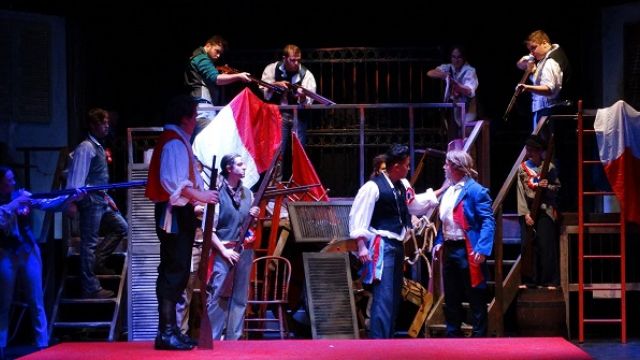Les Misérables
If this reviewer is forced to name one single favourite piece of musical theatre, Les Mis is it. In particular, nothing else on stage (or on record) has been able to match the kind of shivering thrill provided by the climax of Act One. Especially since the cinema adaptation finally materialised in 2012 and became wildly popular (if controversial), one could fairly ask if the show (and its music, thanks in part to a certain Susan Boyle) has finally reached the point of overexposure, unable to avoid looking/sounding/feeling musty and tired. Perhaps someday this will come to pass - but not yet, not by a long shot.
With director JJ Geelen (assisted by Sarah Bicknell) keeping the pace fluid and the tone well-modulated throughout, it’s a sheer pleasure to revisit this grand, passionate tale once again. The generally simple set design (necessitated by the performance area’s relatively modest size) functions, for the most part, very effectively, with the majority of scene changes being efficiently executed (though background activity is a regrettable distraction from the song Turning), while lighting design makes a strong contribution to the overall atmosphere.
The use of projected title cards was rather less successful, some looking awkward and unnecessary, with others being hampered by limited sight lines. Costumes, by and large, looked very fine indeed, except for at least one set of noticeably ‘futuristic’ footwear – and the use of plastic chains on the scene-setting prisoners didn’t really pan out; too noisy, without the compensation of them really ‘looking the part’.

Jon Grear has the central role of hounded convict Jean Valjean, reformed by the forgiving generosity of a bishop, and determined to be absolved in the eyes of God, even if the eyes of the law will never forgive him for breaking parole. Grear’s characterisation communicates less of the desperate, hardened prisoner than one would wish; he seems saintly right from the start, which somewhat diminishes the impact of his crucial epiphany as the prelude ends. Nevertheless, the performer is certainly capable of holding centre stage while commanding our sympathy throughout.
Guy Mansbridge, as the iconic antagonist Javert, brings conviction to the character’s self-righteous steadfastness, while lacking a little in the traits of intimidation and obsessiveness that might have made this a truly rounded and memorable portrayal. Also in disappointingly short supply is a palpable sense of electricity or tension between hero and villain, something which Grear and Geelen must share responsibility in. For this reason, more than one critical scene featuring our two leads feels flatter than it should.
Jordy Irvine-Creaser brings all the emotion to Fantine that anyone could ask for, Joseph Giblin’s Marius combines impressive vocal authority with engaging personality, while Kiera Turner shines like a professional opera star from her first vocal note in the role of Cosette, ably augmented by Alexis Bruce, hushed-yet-hopeful, as the character’s younger version (Jasmine Walter alternates in the role, and was instead capably filling the part of Little Eponine in the performance reviewed). Oliver Reschke and Billie Turner are scarily spot-on as the unforgettable Thenardiers.

Natalie Harding ensures that our hearts go out to Eponine, delivering On My Own in an unusually frail and reticent fashion that, ultimately, feels true to the emotions of the character and the lyrics.Andrew Smith sings especially well as Enjolras, while stage musical newcomer Joel Pathuis absolutely nails the spirit of impish urchin leader Gavroche; he makes every moment count without ever needing to unfairly steal the scene away. This is a debut that carries the promise of a bright future.
The orchestra has its wobbly moments, but is generally up to the mammoth task at hand, while the quality of contribution made by the chorus/ensemble (vocal direction by Deana Constable) is consistently high, and goes a long way toward ensuring the all-around satisfaction that one leaves the theatre with. This production may not be a perfect one, but it gets so much so right so often that it’s still a glory to behold. City dwellers need not fear that their travel time won’t be worth it; the SCCAS have done Les Misérables more than proud. Grab a ticket and hear these people sing before it’s too late.
Anthony Vawser
Subscribe to our E-Newsletter, buy our latest print edition or find a Performing Arts book at Book Nook.

